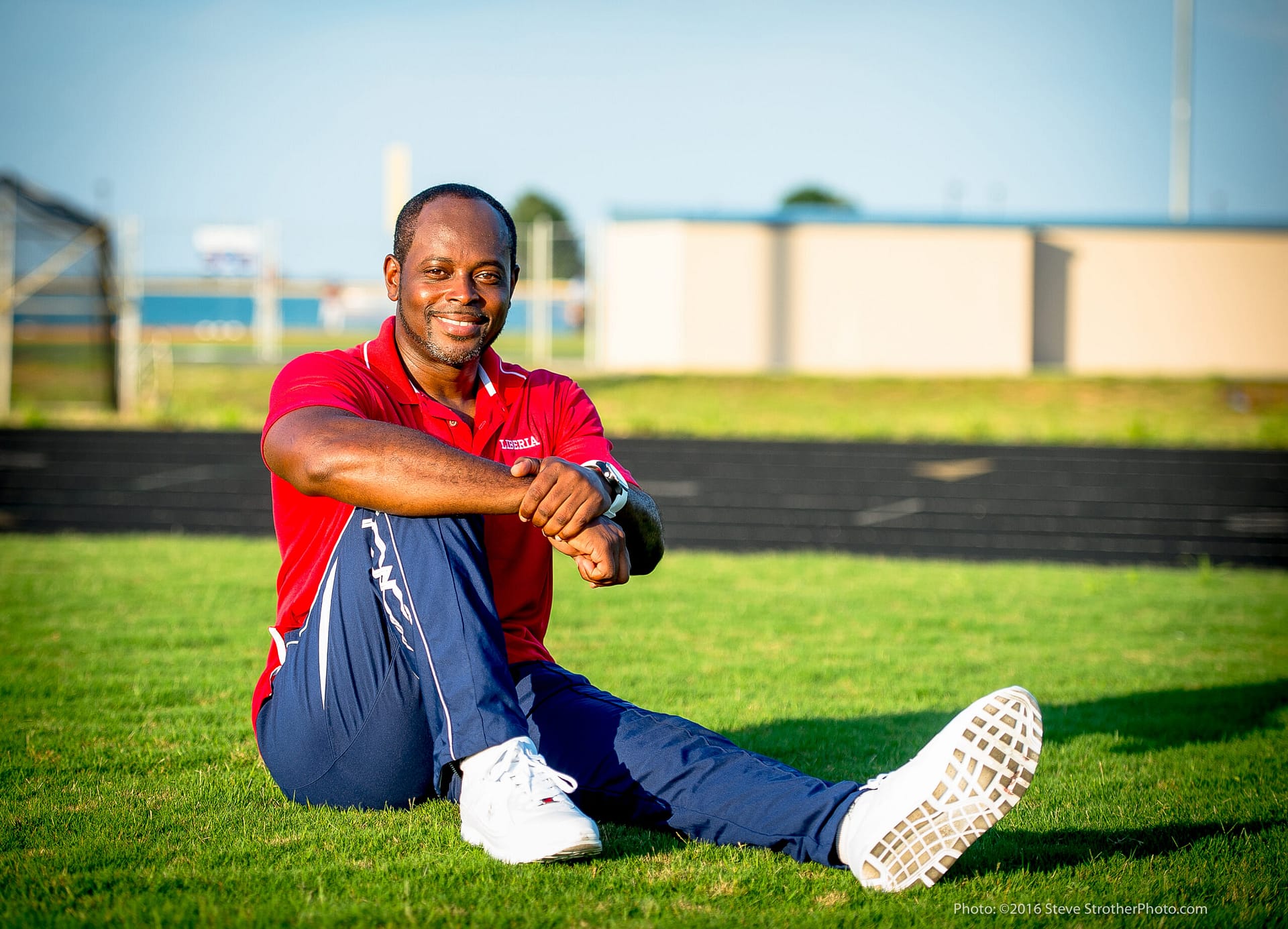Enlarge

Photo by Steve Strother
Wearing stylish clothing created by designer Telfar Clemens and noted in The New York Times, former Abilene Christian University standout sprinter Sayon Cooper (’98) and the small track and field contingent from Liberia made a big splash in recent days at the Opening Ceremonies of the 32nd Olympiad in Tokyo, Japan.
It was not Cooper’s debut on the world stage, however.
The Summer Games are an ACU-record fourth for Cooper. He has two as an athlete (1996 in Atlanta and 2000 in Sydney) and two as coach of his homeland’s team (2016 in Rio de Janeiro and 2020 in Tokyo) to his credit. He also competed in six world championships as a collegiate sprinter and coached Liberia in the 2011 All-African Games, along with the 2016 and 2018 African Championships. He has also coached a number of AAU and USATF All-America and world junior champions.
Cooper is one of 38 Wildcat athletes to compete in the Games, and only the second to coach an Olympic team. The late Bill McClure (’48), head ACU coach from 1963-72, was an assistant coach for the U.S. track and field team in Munich in 1972.
Forty Wildcats have been Olympians, 39 as competitors or coaches in track and field, plus Tom D. Smith III (’54), an American military hero who held world records in pistol shooting and competed for the U.S. in the 1964 Games in Tokyo.
Another ACU grad, award-winning sports journalist Doug Ferguson (’83), is covering golf for The Associated Press in the current Tokyo Games.
Tim Bright (’83), U.S. decathlete and pole vaulter in 1984 (Los Angeles), 1988 (Seoul) and 1992 (Barcelona), and Jamaican hurdler Delloreen Ennis (’99) are the only Wildcats to compete in three Summer Games. Ennis (2000 in Sydney, 2004 in Athens and 2008 in Beijing) narrowly lost a bronze medal opportunity in the 110-meter hurdles final in Sydney.
Cooper, who lives in Atlanta, Georgia, earned a Master of Public Health degree in 2014 from Walden University. His resume includes being program manager for the Kennedy-Satcher Center for Mental Health Equity at Morehouse College School of Medicine (2015-17), a social worker for Grady Health System (2005-15), and a residence advisor for Chris Kids Inc. (2005-13), an Atlanta-based mental health service provider.
He is Intellectual Developmental Disabilities program manager for View Point Health, a community behavioral health center of professionals who provide services to those who need treatment and support to cope with mental illness, substance abuse, and intellectual and developmental disabilities. VPH is one of the Community Service Boards for the state of Georgia.
He is married to Tangi Cooper, director of community services at Grady Memorial Hospital in Atlanta, and they have five daughters in their blended family.
“Our second-born, Taylor, loves the game of basketball and hopes one day to play in the WNBA. Talia (our middle), and Laila (next to the youngest) want to be doctors. Our youngest, Tyla, is undecided. Our oldest, Dianna, wants to be a nurse and attends Bowling Green (Ohio) State University,” he said.
Liberia has three athletes among the 11,000 representing 205 Olympic committees in Tokyo. Their contingent also includes one coach, a team doctor and several officials. Despite the small support staff, Cooper said he focuses on coaching and monitoring the safety of his athletes off the track.
“All elite Liberian athletes have trained in the U.S.,” Cooper said. “All of them went to school in the States or are currently enrolled, like sprinter Joseph Fahnbulleh, who attends the University of Florida. Sprinter Emmanuel Matadi and hurdler Ebony Morrison are out of school and run professionally.”
Cooper works hard to help his competitors not let the pressure of representing their country get to them. “I want to make sure my athletes understand that we have fought many battles to get here. And now, it’s time to win the war,” he said. “As big as the event is, I always emphasize that all they need to do is execute their race.”
He transferred from Central State University in Ohio in 1996, following his first Olympics, and won six NCAA Division II individual titles in his inaugural season as a Wildcat: the 55 meters and 4×400 relay indoors, and the 100, 200 meters and 4×100 and 4×400 relays outdoors.
“ACU was one of my best decisions. I was able to elevate as a person and as an athlete. There was a sense of urgency to be great and that’s what I did in 1997. I never lost a race that year,” he said. “My relationship with God also intensified, which gave me more confidence in life, thanks to daily Chapel, which prepared me mentally each day throughout my days at school. I am grateful to former head coach Wes Kittley (’81) for making sure I achieved my goals off and on the track. He is a man of God and not shy to express it. I love that about him.”
There is some historical mojo for the Wildcats and Team Liberia. Both made their Summer Olympics debut in 1956 when legendary ACU sprinter Bobby Morrow (’58) won three gold medals for the U.S. in Melbourne, Australia.
Liberia’s next Summer Games medal will be its first. It has never sent a team to the Winter Games. But in Cooper, Liberians have found a homeland hero they trust to lead its small nation in big moments on a major athletics stage.
He is, after all, the most recent Abilene Christian track and field legend who knows his way around the Olympic tradition.
“Long live the Wildcats,” Cooper said.
– Ron Hadfield
July 28, 2021
